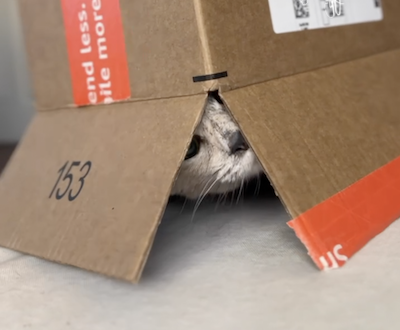To think outside the box, they first must perceive the box
One of my clients recently told me she was frustrated that the team she’d inherited wasn’t thinking outside the box.
She loves the team. She thinks they’re dedicated, passionate, hardworking, and eager to succeed. Yet they just don’t seem to have much imagination.
My client has a long, diverse career with tremendous experience both as a leader and an employee. She’s highly capable and has worked with all kinds of people at all levels, in a variety of types of organizations.
“They’re so stuck in the patterns of the past,” she said. “I keep telling them we need to think more broadly. Think outside the box.”
After talking a bit more, I asked her, “Do you remember the first time you really thought outside the box?”

Forgetting where you came from
Although she had several recent examples, she couldn’t remember the first time.
By the time you’ve risen to a leadership position, you’ve likely had more learning opportunities than you care to remember. The most memorable are probably the most uncomfortable.
And by the time you’ve risen to a leadership position, the most important skills you rely on—your true strengths—are so internalized and second nature that you may get frustrated with other people who just don’t get it.
In my client’s case, she had experienced such a broad perspective over her career, and had built such a keen insight, that she almost couldn’t look at an organization, a system, or a structure, without starting to imagine it in new ways.
That’s what she wanted her team to do, too.
But because that skill came so naturally to her, she forgot that it wasn’t natural for most of her team, and many of them were younger, or had been in only one organization most of their careers.
My client had enjoyed decades of learning and growth, but she had forgotten how naive and green she’d been at the beginning. And she was projecting her experience and perspective onto her team, expecting them to be at the same level she was.
Fish don’t know they’re wet
My client’s team members didn’t know how to respond to “I need you to think outside the box” because they didn’t even realize there was a box.
This reminded me of the saying, “fish don’t know they’re wet.” Often attributed to Marshall McLuhan but probably much older than that, this saying means that fish have no concept of what dry is, so they do not know they’re wet.
This is the situation with people who have only known a limited set of environments. If you have no counter-environment to compare your environment to, then imagining something new can be almost impossible.
And so it was with my client’s team. They had such limited experience elsewhere, that they didn’t even realize they were inside a box. So they were incapable of thinking outside it.

It is not. But I can see how it might appear so.
But that’s how we’ve always done it
This fundamental problem with perspective showed up with confusing symptoms, though.
My client said some of her team had started pushing back on new ideas with, “but we’ve always done it this way” and “we’re doing it this way to be consistent/standardized.”
This frustrated my client because “we’ve always done it this way” is the often code for “I refuse to change.”
But her team members seemed inspired and eager to grow the organization, so this kind of digging-in-the-heels language was confusing.
It turns out that because her team didn’t understand what she meant by thinking outside the box, they kept falling back into language and patterns that were known and comfortable.
While this seemed like reluctance to change, it was simply that these fish didn’t know they were wet.

It’s the manager’s job to foster growth
Once we identified and named the actual issue, my client was able to quickly build a plan for unleashing her team’s imagination. It involved various ways of exposing them to new thinking, encouraging them to challenge the “why” of existing approaches, and offering examples of what she hoped to see from them.
None of this was new to my client. She had done some versions of these things as a leader her whole career.
Talking through the problem and looking at it from other angles—thinking outside the box—helped her see different solutions.
Success won’t come overnight, and it’s possible not everyone will be able to grow into the vision, but she’s feeling refreshed and reinvigorated.
I can help
We are all, in various ways, fishes who are unaware that we are wet. One of the most fundamental values of coaching is helping you identify and name those ways. Because until you can perceive how your perspective is limited, you’ll find it very hard to go beyond the borders.
If you’re struggling with your own inability to think larger, or you’re frustrated with others you feel are dragging you down, give me a call and let’s talk.



0 Comments